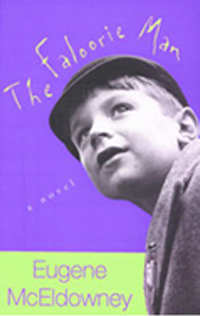Synopsis
In one of the most captivating stories of childhood yet to emerge from Northern Ireland, The Faloorie Man traces the early years of Martin McBride, a young Catholic boy growing up on the streets of post-war Belfast. Stark, funny, at times heart-wrenching, Martin’s coming of age story is set against sectarian division. As he emerges from the cocoon of his family, he faces an uncertain world: the shocking discovery of the difference between boys and girls, the unprovoked fighting on the schoolyard, the torture of education, the doubtful pleasure of illicit sex, and the accidental discovery of a darkly hidden truth.
 Author
Author
Eugene McEldowney is a former news editor with The Irish Times. His novels include Stella's Story and the popular Cecil Megarry Mystery series. The Faloorie Man is the most autobiographical of all his books, and has been published in Britain, Germany and Greece. McEldowney was born in Belfast and lives in Dublin.
Reviews
'An affectionate chronicle, gently told' — Irish Times
'Eugene McEldowney's Faloorie Man has been out for ten years, but GemmaMedia brought it to the U.S. in 2009. This charming semi-autobiographical novel is the coming-of-age story of a Catholic boy growing up in Belfast in the post-World War 2 era. Here's one of my favorite moments, when young Martin McBride decides, for the first time in his life, to go and have a look at the Protestant Taylor boys, who are rumored to live nearby. Martin's never seen a Protestant before, and he's in for a shock.
I didn't know what to expect, but I wouldn't have been surprised if they had horns on their heads. I remembered what Sarah had told me about the Titanic and the way the Orangemen had cursed the Pope and how God had let the sea drown them. It seemed to me that these Taylors would be bad pills altogether.
We finally tracked them to the waste ground at Butler Street. There were two of them and they were kicking a football around. They looked exactly the same as us. They had the same scuffed shoes and snotty noses and torn cardigans. There were no obvious signs that they were Protestants. I was disappointed. We took a good look at them and then got on our bikes and went home.
Such a simple scene, and yet, it says so much. This is McEldowney's strength. Scenes such as this leave a stronger impact than the more dramatic plot developments later in the novel.' ~Worducpia







